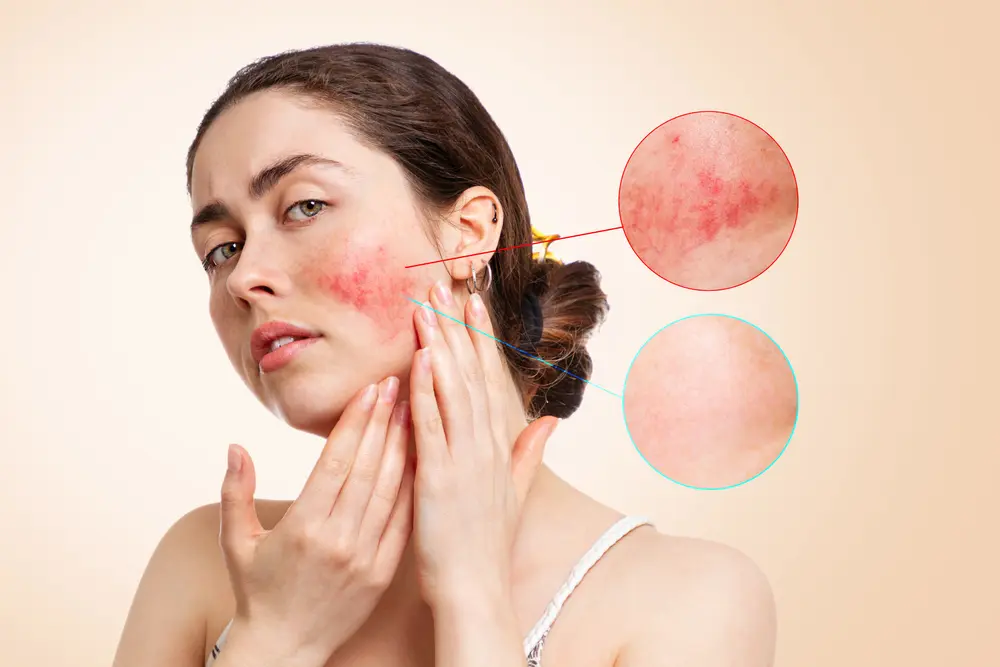Managing sensitive skin can be quite challenging. Whether you’re dealing with redness, irritation, dryness, or itching, it often requires special care. While traditional dermatological treatments can help alleviate some symptoms, they may also come with side effects or contain harsh chemicals that can irritate the skin even more.
In contrast, homeopathy takes a different approach. Homeopathic remedies aim to stimulate the body’s natural healing processes, targeting the underlying causes of sensitive skin issues and offering long-term relief without the use of harmful chemicals.
What Causes Sensitive Skin and How Homeopathy Can Help
Sensitive skin can arise from various factors, such as genetics, environmental influences, hormonal changes, stress, and certain health issues. Conditions like eczema, rosacea, and psoriasis often lead to sensitive skin, resulting in redness, irritation, and discomfort.
While traditional treatments like topical steroids or antibiotics aim to alleviate immediate symptoms, they might not tackle the root causes. Homeopathy offers a different perspective by focusing on the internal factors that contribute to skin issues.
Homeopaths consider the individual as a whole, taking into account emotional health, diet, and environmental factors to pinpoint the underlying causes of sensitivity. This comprehensive approach aims to restore balance within the body, decreasing the chances of flare-ups and fostering healthy, resilient skin.
How Homeopathy and Conventional Dermatology Can Work Together
Homeopathic remedies can be quite effective in addressing the root causes of sensitive skin, but they shouldn’t be considered a replacement for traditional dermatological treatments. Instead, they can serve as a complementary approach, helping to restore the body’s internal balance while dermatology focuses on alleviating external symptoms.
For instance, someone might use topical creams or antibiotics recommended by a dermatologist to tackle the visible signs of their skin issue. At the same time, homeopathic options like Sulphur or Calendula can help reduce inflammation and promote long-term healing by addressing internal issues such as hormonal imbalances or immune system problems.
The combination of homeopathy and dermatology can lead to quicker healing, fewer flare-ups, and better overall skin health, all while minimizing the side effects that often come with conventional treatments.
When to See a Homeopath vs. Dermatologist
In many situations, both a homeopath and a dermatologist can be crucial in managing sensitive skin. Here’s when to reach out to each professional:
Consult a Homeopath: If your sensitive skin reacts to internal factors like stress, hormonal shifts, or allergies, a homeopath can offer a tailored remedy to tackle these concerns. Homeopathy is especially beneficial for conditions such as eczema, rosacea, or psoriasis, where emotional health and lifestyle choices significantly influence flare-ups.
Consult a Dermatologist: If your skin issue is severe, like cystic acne, infected rashes, or any condition needing medical treatment, it’s important to see a dermatologist. They are also vital when prescription medications or topical treatments are necessary to address the issue.
Tips for Managing Sensitive Skin Holistically
Here are some practical tips for incorporating homeopathy into your daily routine to help manage sensitive skin:
- Stay Consistent: Stay Consistent: Take your homeopathic remedies as directed by a professional. This is key in managing recurring issues and can help provide a cure for skin allergy symptoms over time.
- Nourish Your Skin from the Inside: Maintain a balanced diet, stay hydrated, and keep your stress in check. A healthy lifestyle benefits both your body and your skin.
- Choose Gentle Skincare Products: Steer clear of harsh chemicals and opt for skincare items that are free from fragrances and artificial ingredients.
- Be Mindful of Your Environment: Shield your skin from extreme weather by applying sunscreen and moisturizing frequently.
Conclusion
Homeopathy provides a gentle and effective way to treat sensitive skin issues by targeting the underlying causes of irritation, inflammation, and dryness. By aiming to restore balance in the body, homeopathic remedies can help minimize flare-ups and support long-term skin health.
While homeopathy can complement dermatological treatments, it’s essential to work with both a homeopath and a dermatologist to develop a personalized treatment plan that meets your skin’s specific needs. By integrating both methods, you can achieve healthier, more resilient skin without relying on harsh chemicals or invasive procedures.
